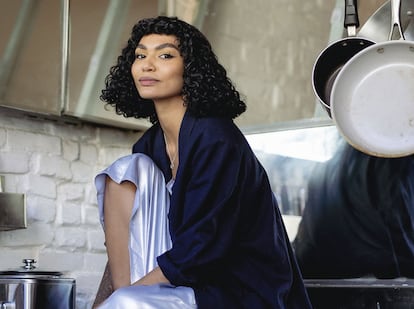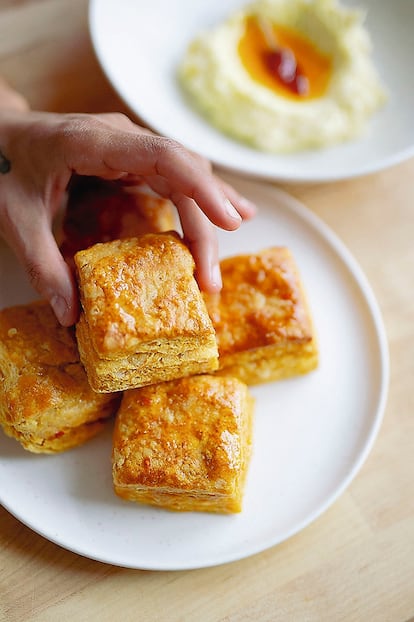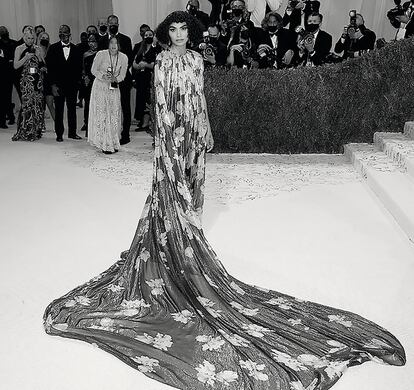Sophia Roe, the kitchen activist: ‘Everything is political, food is political’
The Brooklyn-based chef talks to EL PAÍS about mindful eating, discrimination and why we need systemic changes

For Sophia Roe, the key is to question everything – to turn things upside down and share experiences. That’s why she started cooking. “My first memory of cooking was probably pancake-related. When I was like four or five, I would watch [the TV show] Great Chefs of the World, these incredible chefs that had flames coming out of their oven. I was living in Florida and had an electric oven, and I remember making pancakes for my mom. I always felt the urge to not just feed myself, but to feed other people,” she says in a video call with EL PAÍS.
Now Roe has her own cooking show Counter Space on VICE TV, and also posts videos about recipes on her Instagram page. But the 33-year-old talks about more than just food, she also tries to make people more conscious about what they eat and promotes systemic change.
“I think that we need to understand, why am I eating this? Do I need to be buying a bunch of things in plastic? Are you sure you don’t have the time to cook? We drive to work and we drive home. We order things on the internet. We don’t know where it’s been, where it’s made, how it got here,” she says from her sunny Brooklyn studio, where she prepares her dishes and records her live shows.
Roe says we need to address this complacency. “It’s making us feel comfortable in mindlessness,” she says. “We’re just scarfing down things, we don’t understand the labor. We say ‘oh, I love brioche.’ It takes literally 36 hours to make a loaf of brioche! So I just want people to insert a little bit of discomfort into their lives to end up being a more mindful person.”
For Roe, “everything is political, food is political.” She says that cooking is the most human activity a person can do, explaining “there’s no other species that does it.” She wants people to reflect and fight for change.

“We are all suffering some facet of trauma, and food just felt kind of like the simplest way for me to go about healing,” she says. Roe grew up in a difficult environment, and the kitchen was always her safe space. “My mom is a drug addict,” she explains. “Every single person struggling with addiction deserves redemption. It is a sickness. It’s really not their fault.” For Roe, the blame should not be placed on the individual: “Instead of saying horrible things about people experiencing addiction, I think we need to hold these big pharma companies accountable, we need to hold the systems accountable, the institutions accountable. I see people on the internet mad that someone is eating meat. You can’t be mad that the person is eating meat. Culturally, we’re taught to eat meat. It’s not the person, it’s the system.”

Roe is also an anti-racist activist. It’s an issue she discusses in her Pillow Talk sessions on Instagram, an intimate conversation series where she and her followers discuss their experiences. “You can’t speak monolithically about anything, and definitely not about race,” she says. “Racism is not an opinion. Racism is real, xenophobia is real.”
Before she set out on her own, Roe worked in a number of upscale restaurants, where she was discriminated against for being a woman and Black. But she says a lot has changed since then. “In my generation, in 2008, it was very rough, but now I believe the United States is really doing a great job about not just centering women in the kitchen, but highlighting them and acknowledging them.”
Recognition is important, she stresses. Roe is direct and speaks with confidence. That caught the attention of the organizers of the Met Gala, the prestigious annual fashion event. In 2021, Roe was one of 10 New York chefs chosen to help curate the menu for the event.

“It just felt so great to finally see not just the cooks being acknowledged [at the Met Gala 2021] for what we were making, but also to be allowed into the fashion conversation. Fashion and food have been intersected since fashion and food were a thing. Food is just a medium for creativity. Just like fashion. It’s all art,” she says.
And like everything, they are both wrapped up in politics. She explains: “The very idea that a cook has to be wearing all white and has no fingernail polish, that it has to look a certain way, it’s such a dated concept. Who made those rules? Surely a man made those rules, like the idea of a chef coat. Those chef coats were never even really designed to fit a female body. At the end of the day, I feel like what I wear when I cook is my business. If I want to wear a rainbow apron and have blue eyeshadow on and red lipstick when I cook, that’s my prerogative. You have to show yourself as you are, whether you are a cook, a politician or a teacher. Whatever makes you feel good”
Tu suscripción se está usando en otro dispositivo
¿Quieres añadir otro usuario a tu suscripción?
Si continúas leyendo en este dispositivo, no se podrá leer en el otro.
FlechaTu suscripción se está usando en otro dispositivo y solo puedes acceder a EL PAÍS desde un dispositivo a la vez.
Si quieres compartir tu cuenta, cambia tu suscripción a la modalidad Premium, así podrás añadir otro usuario. Cada uno accederá con su propia cuenta de email, lo que os permitirá personalizar vuestra experiencia en EL PAÍS.
¿Tienes una suscripción de empresa? Accede aquí para contratar más cuentas.
En el caso de no saber quién está usando tu cuenta, te recomendamos cambiar tu contraseña aquí.
Si decides continuar compartiendo tu cuenta, este mensaje se mostrará en tu dispositivo y en el de la otra persona que está usando tu cuenta de forma indefinida, afectando a tu experiencia de lectura. Puedes consultar aquí los términos y condiciones de la suscripción digital.









































